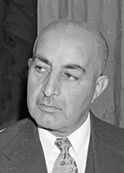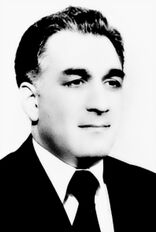
|
The following Cherry, Plum, and Chrysanthemum page or section is a proposal.
It has not been ratified and is therefore not currently part of the Cherry, Plum, and Chrysanthemum timeline. You are welcome to correct any errors and/or comment on the talk page. If you add this template to an article, please don't forget to mention this proposal on the main discussion page. |
| Democratic Republic of Afghanistan د افغانستان ډموکراتيک جمهوريت (Pashto) Timeline: Cherry, Plum, and Chrysanthemum
جمهوری دمکراتی افغانستان (Dari) OTL equivalent: Afghanistan | ||||||
|---|---|---|---|---|---|---|
|
||||||
| Anthem: گرم شه, لا گرم شه (Pashto) Garam shah lā garam shah "Be ardent, be more ardent" |
||||||
| Location of Afghanistan
|
||||||
| Capital | Kabul | |||||
| Official languages | Pashto • Dari | |||||
| Ethnic groups | Pashtun; Tajik; Hazara; Uzbek; Aimaq; Turkmen; Baloch | |||||
| Religion | Islam | |||||
| Demonym | Afghan | |||||
| Government | Federal single-party council republic | |||||
| - | President | Abdul Rashid Dostum | ||||
| - | Premier | Abdul Ali Mazari | ||||
| Legislature | Revolutionary Council | |||||
| Establishment | ||||||
| - | Independence from the United Kingdom | August 19, 1919 | ||||
| - | Establishment of democratic republic | April 28, 1978 | ||||
| Population | ||||||
| - | estimate | 40,218,234 | ||||
| Currency | Afghani (AFA) |
|||||
| Time zone | UTC+4:30 | |||||
| Internet TLD | .af | |||||
| Calling code | +93 | |||||
Afghanistan, officially the Democratic Republic of Afghanistan, is a landlocked country in South Asia. Referred to as the 'Heart of Asia', it borders the Soviet Union to the north, Altishahr to the east, Pakistan to the south, and Iran to the west.
It is a unitary state, with a sole party ruling the country. The general secretary of the communist party is always the president of Afghanistan, while the premier is elected by the government every five years.
History[]
Communist takeover (1976-1979)[]

Photograph of Mohammed Daoud Khan
Between 1973 and 1978, Mohammed Daoud Khan was the first president of Afghanistan. Despite Afghanistan's previous policies to remain neutral in the major political conflict between the United States and the Soviet Union, Mohammed began shifting Afghanistan towards western-friendly policies, and began removing the Soviet military generals and advisers from the government. He also began banning any opposition in fear of communists taking power. This caused a severe downgrade in relations between the Soviet Union and Afghanistan, as the USSR started labelling Afghanistan as a potential threat if it continued its pro-Western policies.
Throughout the mid-1970s, Mohammed's own popularity deteriorated, as he had promised a lot of economy reforms yet did almost nothing, as the economy progressed very little. Eventually, even the People's Democratic Party of Afghanistan, which had helped Mohammed seize power from former King Zahir in the 1973 coup, turned against him. The two rival factions within the PDPA began reconciling, as they began preparing for a move against the Afghan government. On April 27, 1978, communist Afghan troops that were situated at the military base at Kabul International Airport began moving towards Kabul itself. It took only 24 hours to fully remove Mohammed from power, who was eventually executed along with the rest of his family the following day. Meanwhile, the PDPA that had fully seized power proclaimed the new Democratic Republic of Afghanistan, which was one of the major events that would convert Afghanistan from a poor, secluded country into a country of international terrorism.
Social and land distribution reforms were implemented by the Communist Party - despite these reforms, major opposition against the new government emerged, most notably the mujahideen. The situation escalated into a form of civil war, which slowly became a proxy war between the Soviet Union and the Western nations; Pakistan and the United States sent aid to the rebels, while the Soviet Union sent thousands of military advisers to support the regime. Meanwhile, there was a major division within the Communist Party between the dominant Khalq and the more moderate Parcham.
Soviet invasion (1979-1987)[]

In September 1979, General Secretary Nur Muhammad Taraki was assassinated on orders secretly from second-in-command, Hafizullah Amin, who then took power. Under Amin, the situation in Afghanistan worsened as relations with the Soviet Union deteriorated. He attempted to improve relations with the United States and Pakistan in an attempt to halt US-Pakistani aid to the rebels which was tearing the nation apart. The Soviet leadership was dissatisfied with his leadership, and with fears of Amin fully defecting to the West, decided to invade Afghanistan on 24 December 1979 and replace Amin with Babrak Karmal of the Parcham faction. The invasion was condemned by a majority of nations, especially the United States and the Islamic world - the Organisation of Islamic Cooperation adopted a resolution demanding the withdrawal of Soviet troops from Afghanistan.



